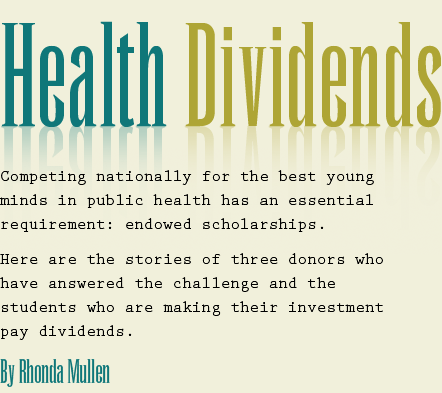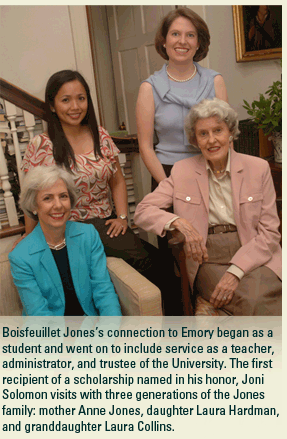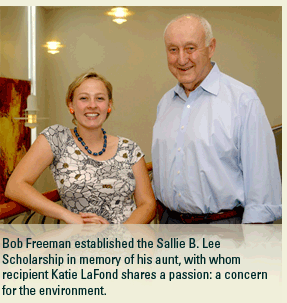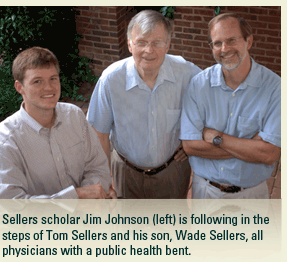











|
 |
 |
 |
| |
|
|
| |
|
|
 |
Inaugural
Boisfeuillet Jones Scholar

|
 |
 |
 ack
from the beachfront dotted with expensive houses and flocks of tourists
is the real world of this Philippine island. The people live in
poverty: their homes are one-room shanties, and their living conditions
open the door to a host of infectious diseases—diarrheal and
respiratory disease, tuberculosis, pneumonia. ack
from the beachfront dotted with expensive houses and flocks of tourists
is the real world of this Philippine island. The people live in
poverty: their homes are one-room shanties, and their living conditions
open the door to a host of infectious diseases—diarrheal and
respiratory disease, tuberculosis, pneumonia.
Joni Solomon, a Filipino physician,
worked in a three-bed clinic on this island, where, despite her
efforts, children died of pneumonia and diarrhea, who could have
been cured with better medicines or earlier intervention. “I
saw a lot of death that could have been prevented. As a doctor,
that frustrates me,” she says.
In the Philippines, the health challenges are not just contained
on the remote island, 20 minutes by air from the nearest big island and some two hours from Luzon on the main island. In the biggest
public hospital in the country, where Solomon interned, there was
no room to isolate patients with tuberculosis. “In the United
States, when people with TB refuse treatment, they can be quarantined,”
says Solomon, “but at home, there is no such response.”
and some two hours from Luzon on the main island. In the biggest
public hospital in the country, where Solomon interned, there was
no room to isolate patients with tuberculosis. “In the United
States, when people with TB refuse treatment, they can be quarantined,”
says Solomon, “but at home, there is no such response.”
Solomon, the baby of her family, had
never studied abroad, but she felt she needed additional skills
to make a dent in the health care challenges in her native land.
An opportunity led her to this country and to the RSPH to pursue
an MPH in 2003. She originally considered 10 schools, applied to
four, and was accepted at all of them. Her choice of Emory came
down to the presence of the CDC next door and a scholarship. “With
55 pesos to the dollar, I couldn’t have afforded it without
a scholarship,” Solomon says.
Solomon is the school’s first
Boisfeuillet Jones Scholar. Jones had a relationship with Emory
for seven decades—as student, teacher, administrator, and
trustee. During the 1950s, he was Emory’s vice president of
health services. He went on to serve under Presidents Kennedy and
Johnson as special assistant to the Secretary of Health, Education,
and Welfare, where his duties included responsibility for the U.S.
Public Health Service. He returned to Atlanta as head of the Robert
W. Woodruff Foundation, which during his tenure supported many health
initiatives.
Anne Jones, his widow, discussed an
appropriate memorial to her husband with her children, Emory trustee
Laura Hardman and Washington Post publisher Boisfeuillet
Jones Jr. “We decided one of the most effective things you
can do for an institution of higher education is to endow a scholarship,”
says Jones, who served for many years as a trustee of her alma mater,
Agnes Scott.



Jones is nothing short of delighted
with the first recipient of the scholarship. She has gotten to know
Solomon over lunches and brags on the young scholar as she would
on one of her own children. She met Solomon’s mother and sister
for lunch when they came to Atlanta for graduation, and Jones was
impressed by the closeness among them. When Jones attended graduation,
Solomon had more good news for her: an A on her thesis. “She
told me she didn’t want to disappoint me or her family,”
Jones says.
Anne Jones has only one regret about
Joni Solomon—that Boisfeuillet Jones didn’t get to meet
her. “She sets a high level for future recipients,”
Jones says, “and I will follow her career. If we’re
going to make this world better, she’s the kind of person
who’ll do it.” |
 |
| |
 |
|
 |
Aunt
Sallie's example
 |
|
 |
 allie
Lee was a familiar sight to her Beverly Hills neighbors: a spry,
gray-haired woman riding a tricycle and picking up aluminum cans
to recycle. Full of energy and spirit, Lee cared about the environment,
children, and education, according to her nephew and the trustee
of her estate, Robert Freeman. allie
Lee was a familiar sight to her Beverly Hills neighbors: a spry,
gray-haired woman riding a tricycle and picking up aluminum cans
to recycle. Full of energy and spirit, Lee cared about the environment,
children, and education, according to her nephew and the trustee
of her estate, Robert Freeman.
Freeman, a retired executive, is following
in his aunt’s path with his volunteer work with leadership
in the Atlanta Community Food Bank and Medshare. A nonprofit company
Freeman cofounded in 1998, Medshare is dedicated to recycling unused medical
supplies and equipment to health care institutions in developing
countries. RSPH students volunteer with the effort, which has recycled
more than $25 million to countries around the world since its founding.
cofounded in 1998, Medshare is dedicated to recycling unused medical
supplies and equipment to health care institutions in developing
countries. RSPH students volunteer with the effort, which has recycled
more than $25 million to countries around the world since its founding.
Freeman met Dean James Curran through
service on the RSPH Dean’s Council. As Freeman learned more
about the RSPH, he realized he had found a cause that Sallie Lee
would embrace: supporting the education of young, bright people.
Since the establishment of the Sallie
B. Lee scholarship in 1997, Freeman has been impressed with the
diversity of the recipients. This year’s scholar, Katie LaFond,
is an environmental and occupational health student who is interested
in how infectious diseases interact with the environment. Her work
in Lesley McGee’s laboratory, which focuses on antibiotic
resistance and the global epidemiology of pneumococci, led to a
summer internship in South Africa with global health professor Keith
Klugman, who has an active research program in Johannesburg on pneumococcal
disease.



During the 2005-2006 academic year,
LaFond will broaden her studies as a fellow in the Center for the
Study of Health, Culture, and Society. Her education is fueling
the question that originally brought her to public health: how diseases
respond to human behavior. “Our environment responds to us,”
says LaFond. “Dumping toxins into the environment or dumping
antibiotics into ourselves or our animals may come back in ways
that we don’t expect.” |
 |
| |
 |
|
 |
The
making of a public health physician

|
|
 |
 n
the 1980s, Tom Sellers, as chairman of the Department of Community
Health in Emory School of Medicine, found himself defending and
promoting a place for public health on campus. n
the 1980s, Tom Sellers, as chairman of the Department of Community
Health in Emory School of Medicine, found himself defending and
promoting a place for public health on campus.
Sellers had public health in his bloodline.
His father earned a public health degree in 1918 from Johns Hopkins
and later went to Emory’s medical school at the age of 32.
The senior Sellers was director of the state of Georgia’s
Division of Public Health for 12 years. Before that, he served there
as director of laboratories for more than 30 years.
Tom Sellers’ son, Wade, was
in the first class to graduate from RSPH in 1990, the year it became
a school. “When Wade was a boy and was asked, ‘What
do you want to be when you grow up,’ he’d say ‘I
don’t know, but I won’t be a doctor,’” his
father remembers. He would change his mind, but his career path as a physician
has not been a conventional one.
remembers. He would change his mind, but his career path as a physician
has not been a conventional one.
After college, Wade Sellers took an
orderly job in the mental health wards at Grady Memorial Hospital.
With doctoring in his family, that experience led him to pursue
medical studies. After getting his M.D., he joined the Fulton County
Department of Health. He was drafted into the Public Health Services
Corps and assigned to run the state health department clinics in
Albany. He later returned to the RSPH for an MPH. “He wasn’t
happy with the traditional medicine choices,” says Tom Sellers,
“but he is very happy in public health.” Today, the
younger Sellers is in charge of state public health programs in
two districts in Northwest Georgia.
Tom Sellers was instrumental in building
Emory’s community health program, the precursor of the school,
and on his retirement, his colleagues and friends joined together
to honor that effort with an endowed scholarship in his name. Fittingly,
it supports students in the joint MD/MPH program, which allows medical
students to earn an MPH in one year of course work between their
third and fourth years of medical school. Each year, approximately
12 students enter the program.

“Emory makes it easy to do the
MD/MPH,” says current Sellers scholar Jim Johnson.
Johnson, whose own grandfather was
a general surgeon, says it was easier to consider incorporating
public health into his medical studies because of the funding he
received from the Sellers scholarship. He has just completed his
MPH year and a summer research project on methicillin-resistant
Staphylococcus aureus at Grady Memorial Hospital.
“This year changed my perspective,”
says Johnson. “During medical school, you are so busy, you
often don’t have time to see the bigger picture. During this
year, I became more aware of how our health care system impacts
a particular patient, how you can change the system, and how advocacy
at a higher level can bring a lot of influence to bear.” |
 |
| |
|
|
| |
| |
|
|
| |
THERE
IS NO WAY AROUND IT: private
education is expensive. It is particularly expensive when
the students pursuing that private education are preparing
for a field that emphasizes the promotion of health worldwide
rather than the accumulation of personal wealth. High levels
of debt may prevent public health graduates from doing what
they are trained to do—bring interventions to developing
countries or to run nonprofit clinics in the inner city.
The solution? A substantial endowment for scholarships is
one way to attract the brightest students, and it is a crucial
element of a newly completed strategic plan for the RSPH.
If you’d like more information on supporting scholarships
and enabling RSPH graduates, please contact Kathryn Graves,
assistant dean for development and external relations, at
404-727-3352, kgraves@sph.emory.edu. |
|
| |
|
|
| |
|
|
| |
|
|
|
|
| |
|
|
| |
|
|
|
|
|
|

